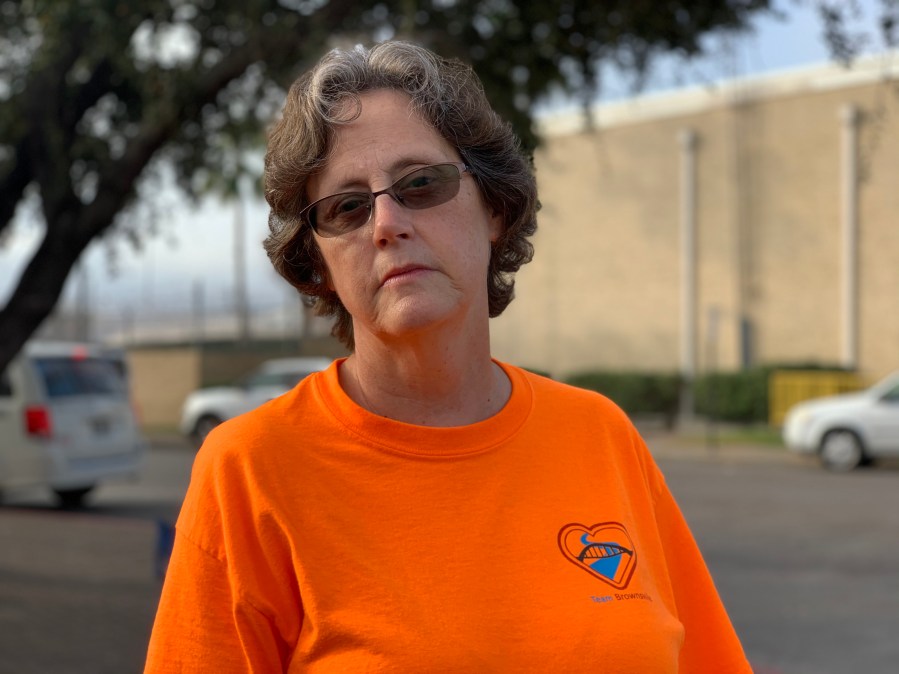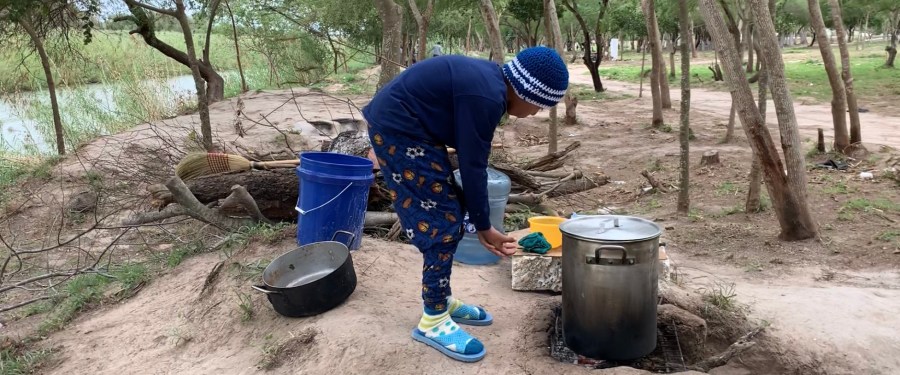BROWNSVILLE, Texas (Border Report) — Thousands of asylum-seekers living at a tent encampment at the base of the Gateway International Bridge in Matamoros, Mexico, across from Brownsville, Texas, are having to fend more for themselves lately after a nonprofit is no longer making meals for them due to COVID-19 fears.
World Central Kitchen, an international NGO for the past couple of months had been preparing daily dinner meals in Brownsville for the Matamoros tent encampment. Volunteers with Team Brownsville and other local groups then would walk over and help serve the meals to about 3,000 asylum-seekers every night. But fears of the coronavirus last week forced the operation to cease, Andrea Rudnick, who heads volunteers for Team Brownsville, told Border Report on Monday.

After President Donald Trump on Friday announced the U.S.-Mexico border would be closed to all non-essential travel, World Central Kitchen administrators decided not to allow their staff to cross into Mexico, Rudnik said. The NGO had been cooking for the asylum-seekers, most of whom are forced to remain in Mexico under the Trump administration’s Migrant Protection Protocols program.
Rudnik last week also announced that no volunteers who had traveled from other areas to come help would be allowed to help in the camp due to fears of bringing COVID-19 to the migrants. The sudden lack of manpower in essence halted the operation, she said.

“We can’t invite volunteers from other places right now,” Rudnik said. “They need volunteers for all the chopping and salad work.”
In the interim, Team Brownsville has contracted with a local restaurant in Matamoros to provide dinners for the camp, at least for a while. That restaurant also provides daily breakfasts of tacos to the camp. Team Brownsville pays for the food via online donations that come to them from throughout the world.
“People are eating. People have their meals. We also have distributed a lot of bulk food items like rice and beans and pasta and canned meats and canned vegetables. So people are able to make meals,” Rudnik said.
But the mood in the camp in somber, something she noticed began over a week ago as the first cases of coronavirus began to strike the Southwest border and Mexico.
“We don’t even have one single coronavirus case yet,” Rudnik said on March 14 after she crossed with a group of volunteers to serve dinner to the migrants. “They’re really worried about that and they’re hearing things in the news and changes in the law and they have a lot of questions.”
That night at dinner, Rudnik said she saw far fewer migrants lining up for food. Videos on social media last week posted by volunteers in the camp and some that offer school to children living there, also showed the migrants not out and about as usual, but inside their closed tents.

Photos have been posted throughout the camp in Spanish explaining proper hand-washing procedures, and additional hand-washing stations have been added.
Over the weekend, many migrants left the camp, Rudnik said. The Mexican military sent buses to the camp and offered free transportation to the southern Mexican town of Tapachula, near the Guatemalan border, for any adult who wanted to go.
Many included those who felt their asylum case pleas had been exhausted and would not win their cases. “There was a variety of people who decided to give up on their asylum cases who already had been told they did not have a chance. No force or coercion was used,” she said. “It was a free way to get to Tapachula.”
Father swam across Rio Grande with son
The exclusion of children on the buses had many migrant advocates worried that some asylum-seekers would send their children over the Gateway bridge alone to claim asylum as unaccompanied minors to U.S. authorities. One father swam across the Rio Grande with his five-year-old son and waited for U.S. Border Patrol to pick up the child before he swam back and rejoined the camp, Rudnik said.
“It’s really tragic that a parent would have to do that,” Rudnik said. “But that’s the reality of what they’re facing now.”
Visit BorderReport.com for the latest exclusive stories and breaking news about issues along the United States-Mexico border.
















